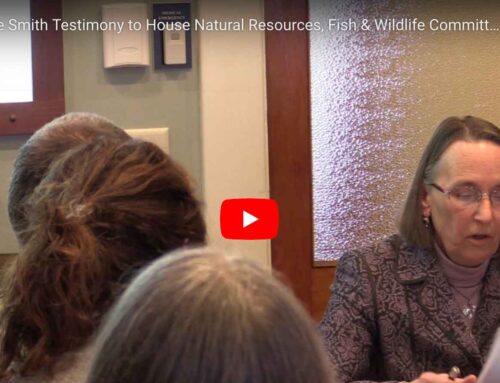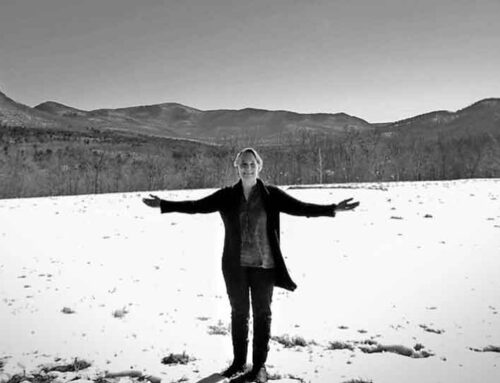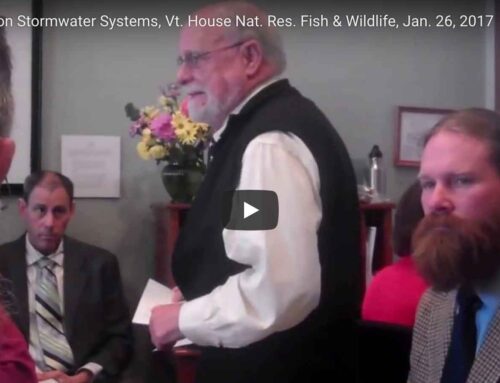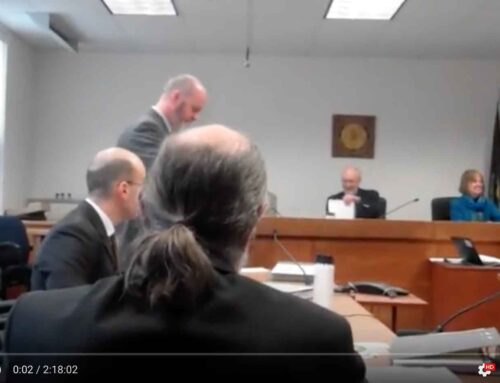http://vermontbiz.com/news/january/annette-smith-kafkaesque-world-windmill-neighbors
Annette Smith: The Kafkaesque world of windmill neighbors
Mon, 01/30/2017
by Annette Smith
The definition of “Kafkaesque”: “Describing something that is horribly complicated for no reason, usually in reference to bureaucracy.” Neighbors of operating and proposed wind projects are watching in disbelief as they witness the Public Service Board (PSB) issue Orders affirming the rights of the wind industry while putting neighbors through expensive, time-consuming legal processes that tramples neighbors’ rights and provide no relief.
Paul Brouha of Sutton lives 6,385 feet from the nearest turbine in the Sheffield Wind plant. He filed his first noise complaint on Dec. 24, 2011, after the wind turbines began operating in October. The PSB dismissed his complaint.
Brouha hired a noise expert who conducted testing and found that instead of the 15 decibels (dBA) noise attenuation between outside and inside projected by wind company experts, the home attenuated 1 dBA. The expert’s measurements showed “multiple and frequent violations of the CPG noise criteria.” The PSB ordered the Department of Public Service (DPS) to investigate the complaint early in 2014. DPS hired a consultant who conducted the same test on July 1, 2014.
In January 2015, Brouha filed a nuisance lawsuit in Superior Court in Vermont.
In Sept. 2015, DPS reported to the PSB that Sheffield Wind exceeded interior noise standards 10-14% of the time.
At the end of 2015, the PSB opened an investigation. Sheffield Wind moved to stay Brouha’s nuisance lawsuit which they had moved from Superior to Federal Court. The Federal judge approved the stay request until the PSB ruled on the complaint.
Brouha’s nuisance complaint has been held hostage by the PSB’s laborious investigation and enforcement process for a year, during which Sheffield Wind, DPS, and Brouha filed written arguments about whether or not a violation occurred. Brouha argued that the project is in violation. Sheffield Wind vigorously argued that new monitoring must take place. The PSB Hearing Officer agreed. Brouha filed a Motion to Reconsider six months ago. The Hearing Officer has not ruled.
The parties agreed to have their noise experts meet to try to agree on a new monitoring plan. They did not come to agreement.
On Jan. 25, 2017, the Hearing Officer held a daylong technical hearing in Brouha’s noise complaint case. Each expert’s noise monitoring plan was presented. Sheffield Wind wants an entirely new protocol. DPS argues for a protocol that would change the noise standard. Brouha asks to use the protocol originally approved by the PSB. The hearing did not finish, so three PSB staff, five attorneys and their experts will return to the PSB for another hearing.
Brouha has spent nearly $350,000 so far attempting to get his noise complaint addressed. No end is in sight.
Melodie and Scott McLane live 3800 feet from the Georgia Mountain Wind turbines. After they filed more than 30 noise complaints, the PSB opened an investigation in Nov. 2015. In March 2016 the McLanes filed a complaint about the turbines operating under icing conditions. The PSB opened another investigation.
Attorneys for GMW (same attorneys representing Sheffield Wind), DPS and the McLanes argued on paper about whether an attenuation test at the McLane home should be conducted, and whether the winter operating protocol required the turbines be curtailed under icing conditions. GMW vigorously argued against testing at the McLane home.
The McLanes also filed a noise complaint along with the icing complaint, because they experienced the loudest noise for the longest period of time since the turbines began operating in 2013. In every filing in the icing docket, the McLanes reminded the PSB that they also were filing a noise complaint.
Recently, the PSB issued an Order [i] finding GMW violated its CPG by operating its wind turbines under icing conditions in March 2016, and issued a negligible $2000 fine. The same day, the PSB fined a solar company [ii] $17,000 for failing to comply with a condition involving a fire lane. No one was harmed by the failure of the solar company. The McLanes sleep is regularly disrupted by the wind turbine noise. The PSB declined to address the accompanying noise complaint.
In response to the McLane’s 2015 noise complaint, both the PSB Hearing Officer and DPS recommended testing to determine the attenuation of the noise from inside to outside. The Board denied [iii] the testing but gave the McLanes and DPS ten days to file paperwork asking to engage in further discovery and cross-examination of GMW’s expert to decide if outside to inside testing should be done.
The McLanes also filed a Motion for Relief in Nov. 2015. In denying that motion [iv], the PSB said, “Nothing in our Order today prevents the McLanes from seeking any individual relief that may be available to them in a forum that has the requisite authority to review their personal circumstances and to take action as may be warranted.” In other words, they can file a nuisance lawsuit in court and follow Paul Brouha down the path that leads back to – the PSB.
The legislature says it’s the PSB fault. The PSB says it’s the legislatures fault. Vermonters are victimized while the wind industry profits.
Annette Smith is Executive Director of Vermonters for a Clean Environment, Inc. She is the Burlington Free Press’s 2016 Vermonter of the Year.
[i] http://vce.org/2000civilpenalty_March%20Icing%20Complaint%20PSB%20decision.pdf
[ii] http://vce.org/17000civilpenalty.pdf
[iii] http://vce.org/26365632768515onbase-unity_9630467781853243962494.pdf
[iv] http://vce.org/26360527605365onbase-unity_96132205239795106026150.pdf






